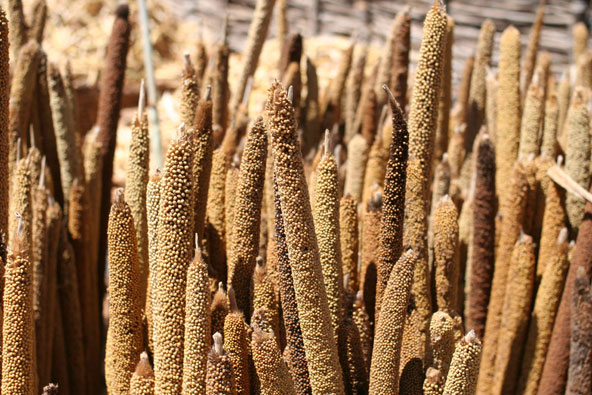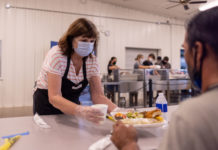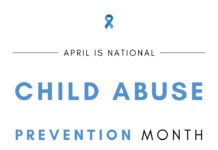
I haven’t finished processing our visit to Niger, and now I’m sitting in the Palm Beach Hotel lobby in Ouagadougou, Burkina Faso.There’s so much left to say about our visit to Niger, much of which Ambria and I will write about in the November issue of The Catholic Sun.
We’ve arrived here, though, and the Catholic Relief Services program in Burkina certainly deserves accolades. We’ve been well welcomed by the staff, travelled to an exceptional museum (more on that in a later post) and dined at a lovely outside restaurant down the street from our hotel. We’ve also had a taste of the many charitable works in which CRS is engaged here.
Burkina Faso and Niger have a lot in common — like millet (above). There’s a lot of differences as well. My first impression of the country is that it’s far more developed than Niger. (The two countries are now, according to the Associated Press, in a borderland dispute. The case is being decided by the Hague.) I’ve also heard estimates that 15 percent of Burkina is Catholic, whereas less than one percent of Niger is Catholic. But religious tension doesn’t seem to be an issue in either country.
Burkina Faso means “land of the upright people” or “land of integrity.” The country changed its name to Burkina Faso from Upper Volta in 1984. It joins Niger near the bottom of the United Nations’ Human Development Index. Both countries are in the Sahel, which — a Niger government official told me yesterday — is creeping south. The Sahara Desert is expanding and leaving less and less fertile ground in Niger and Burkina. Both Niger and Burkina’s people are farmers, and vulnerable to drought and other market variables.
Both countries are also receiving refugees from Mali, another landlocked country which Niger and Burkina both border. Burkina received it’s first refugees in February, according to CRS staff here. Violence broke out in Mali in January.
Poor soil, inadequate communications, illiteracy and a vulnerable economy all contribute to the nation’s problems. I’m looking forward to learning how Catholic Relief Services is helping the country deal with these issues. But first, tomorrow morning, we will start things off with 7 a.m. Mass at the Ouagadougou cathedral.






